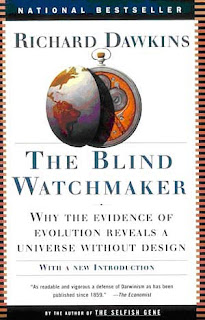
I hope that the “Our View” piece in the Friday, May 13, 2005 News Herald has corrected the pervading misunderstanding that because evolution is just a theory it should not be taught as fact; however, I think there are far more telling reasons to question the necessity of teaching all that the theory of evolution entails: namely what it has to say about origins.
The writer of our view states, “Among modern biologists there is no battle over the truth of evolution.” I mean no disrespect, but I do not believe this is true. Many of the proponents of Intelligent Design are not just “religious adherents,” but accredited scientists in their respective fields.

The writer of “Our View” mentioned Richard Dawkins for the evolution side, but did not name anyone on the other side of the debate.Michael Behe, for instance, is a professor of biochemistry, who, not in spite of, but because of his scientific study has weighed evolution and found it wanting. I do not pretend that because Intelligent Design advocates have some PhD’s on their side their views in this area are justified. Nonetheless it’s hardly fair to dismiss a viewpoint because it is embraced by a minority. The substance of the argument should determine the response, not the number of proponents.
Every article I’ve read addressing I. D., however, has ignored the ideas of ID, and has instead launched into character attack (see cartoon at top). ID proponents are portrayed as little more than illiterate fundamentalist creationists who want to dilute science with religion. This is the trump card the evolution advocate pulls: all they have to do is connect I. D. to God and religion, and they can stage this as the mythical battle of science versus religion, Galileo vs. the Church, or Clarence Darrow versus William Jennings Bryan. The immediate implication is that if we let religion win this debate, we’ll find ourselves on the road to the dark ages. It’s a fine use of ad hominem, but aside from educating readers in the art of sucker-punch rhetoric it does little to present the debate in an honest and objective light.
 One of Intelligent Design’s key questions concerns an apparent breakdown in logic consistently overlooked or ignored by evolutionists. Richard Dawkins wrote a book, The Blind Watchmaker, in which he describes a program he fashioned for the Mac enabling users to breed facsimile biomorphs in order to simulate evolution. Dawkins states that he attempted to avoid using his knowledge of biology in “designing” the program. I found his use of words quite telling-he had to design a program that would make it possible for even simulated evolution to occur. Now, this is an old argument, I know, but I and others who find merit in Intelligent Design theory are still incredulous. If Dawkins had to design a program that only uses 1’s and 0’s to do its thing, how do we expect something as complex as DNA (composed of four bases) to be shuffled into order without intelligent help?
One of Intelligent Design’s key questions concerns an apparent breakdown in logic consistently overlooked or ignored by evolutionists. Richard Dawkins wrote a book, The Blind Watchmaker, in which he describes a program he fashioned for the Mac enabling users to breed facsimile biomorphs in order to simulate evolution. Dawkins states that he attempted to avoid using his knowledge of biology in “designing” the program. I found his use of words quite telling-he had to design a program that would make it possible for even simulated evolution to occur. Now, this is an old argument, I know, but I and others who find merit in Intelligent Design theory are still incredulous. If Dawkins had to design a program that only uses 1’s and 0’s to do its thing, how do we expect something as complex as DNA (composed of four bases) to be shuffled into order without intelligent help?What I and perhaps most I. D. proponents want is some proof of evolution. I see the theory of gravity at work everyday; it’s not hard for me to accept, but I must ask the child’s question: where is evolution?1 For years, agnostics and atheists have used the child’s question to debunk God-“If he’s there, then why doesn’t he show himself!” I’m asking the same question of evolution: “If it’s there, show me DNA shuffling itself into order without intelligent help!” I would like to see it at work. I don’t mean microevolution, i.e., adaptations or mutations; they are testable and provable. I am concerned with the central concern of this whole debate: origins.
Much has been made about Darwin’s The Origin of Species, and having read some of it, I can see where he was going, and how he reached certain conclusions. If he would have stayed with the notion of natural selection affecting change from species to species, I would be fine with that, but he and all the evolutionary theorists since then didn’t stop there. I think the title of that book should have been “The Origin of the Kingdoms,” because Darwin’s premise was that a Creator (yes, it is in the book, so if we are fair I guess we have to edit Origin of the Species so no students will be forced to hear about an impossible-to-prove Creator) breathed life into a few forms or ONE. Hmmm…but all the evidence he gives in the book involves changing from species to species, hardly proof that giraffes and amoebas have the same ancestor. 2 So spaniels and pointers have the same ancestor? Yes? They’re both dogs! Am I too simpleminded because I believe God created a proto-dog from which other species evolved, but can’t accept the fact that dogs and man have the same ancestor? Why are we even having this silly argument about Intelligent Design being such a scientific heresy if Darwin himself left room for an Intelligent Designer? What’s the big deal with teaching two opposing viewpoints on a topic that cannot be proven in the lab?
Well, High School biology textbooks do claim to have proofs from the lab that address the origins of life on earth from an evolutionary perspective. One is a 1953 experiment in which Miller and Urey simulated the conditions of primordial earth and produced goo brimming with amino acids and organic compounds: the building blocks of life. The book does not mention, however, that the results were inaccurate in light of recent evidence.
According to Bill Bryson, in his book A Short History of Everything, “Despite half a century of further study, we are no nearer to synthesizing life today than we were in 1953 and much further away from thinking we can. Scientists are now pretty certain that the early atmosphere was nothing like as primed for development as Miller and Urey’s gaseous stew” (287). If we were really concerned about the integrity of the scientific education, why is an experiment known to be inaccurate for over thirty years still taught?
Bryson goes on to say that recent experiments in this area have only managed to produce one amino acid, and scientists have absolutely no idea how proteins were formed, which is the real kicker. You see, the fact that no protein has been formed in the lab without intelligent help is the problem I have. I want to see this kind of evidence.
Now, you may be saying, “that’s impossible; you’re making demands that are too high. You’re asking for a miracle.” Exactly! God is kept out of the classroom because His existence cannot be determined by means of science, but science still can present no empirical evidence that evolution could work on the most fundamental level of all: the origin of life. Without scientific evidence, this aspect of evolution is nothing more than metaphysics, i.e., religion.
The writer of “Our View” states, “Scientific hypotheses need to be falsifiable: there has to be a way they could be proven wrong,” but even when aspects of evolution are disproved (as above), the public never hears and students are still taught the proof-turned-myth as science.
I close by referencing the article, “Evolution Debate Moves to Florida” in the Tuesday, May 10, 2005 News Herald in which Marcia Brady said, “We’re not certified to be theologians. That’s social or religious studies.” If metaphysics are to be removed from the high school classroom, please be fair about it, and remove those traces that have mingled with accepted scientific theory. If theists can’t teach their view of origins in the classroom then why is the evolutionist able to teach theirs with no natural or scientific proof to back it?
1 Agnostics use the child’s question of God- “If He exists, where is he?” The problem with asking that question of a being with intelligence is that the being has every ability and right not to answer. If God doesn’t want to reveal himself to people who demand proof, is there a natural law that says he has to? But the evolutionist cannot evade my child’s question: if evolution is true-why can’t we see it at work-there is no intelligent force behind evolution-it is a mechanical process, so it doesn’t have any say. If it works, it works, no matter who’s looking. But the problem is that it doesn’t work while people are looking. It does its amazing work over millions of years so no can observe it. To me it seems clear that this is outside of the realm of science. No one can see it happening, so why are evolutionists so intent on keeping it in the classroom? Sure, I can’t see gravity, I can’t see electricity, but I see their effects and experiments show that they ARE HAPPENING NOW-in the present, but evolution isn’t. Where are the missing links? Why hasn’t the fossil record borne the theory out? That is exactly the point.
2 He does give a lengthy hypothesis that shows how evolution that introduces new Classes, Orders and Phylums COULD happen, but do we have ANY observable proof that this in fact is happening or has happened? Where is the proof of this kind of change? This is an honest question. I don't know of any-if you know more of this than I do and know of some proof in this vein, I would like to hear about it.











